Motivational Strategy: Leadership & Management Approaches for Hays
VerifiedAdded on 2023/06/15
|14
|1099
|414
Report
AI Summary
This report develops a motivational strategy for a company, addressing both intrinsic and extrinsic motivation and motivational factors effectively. It applies leadership and management theories to various workplace circumstances, such as low productivity and lack of clarity, using transactional and administrative management theories. The report assesses how leadership and management approaches contribute to continuous improvement, recommending employee engagement and clear vision setting. It includes a reflective statement on the learning experience and concludes that motivation is crucial for employee effectiveness, supported by references to relevant literature. Desklib provides this and other solved assignments.

Part-2: Presenting Motivational
Strategy
Strategy
Paraphrase This Document
Need a fresh take? Get an instant paraphrase of this document with our AI Paraphraser
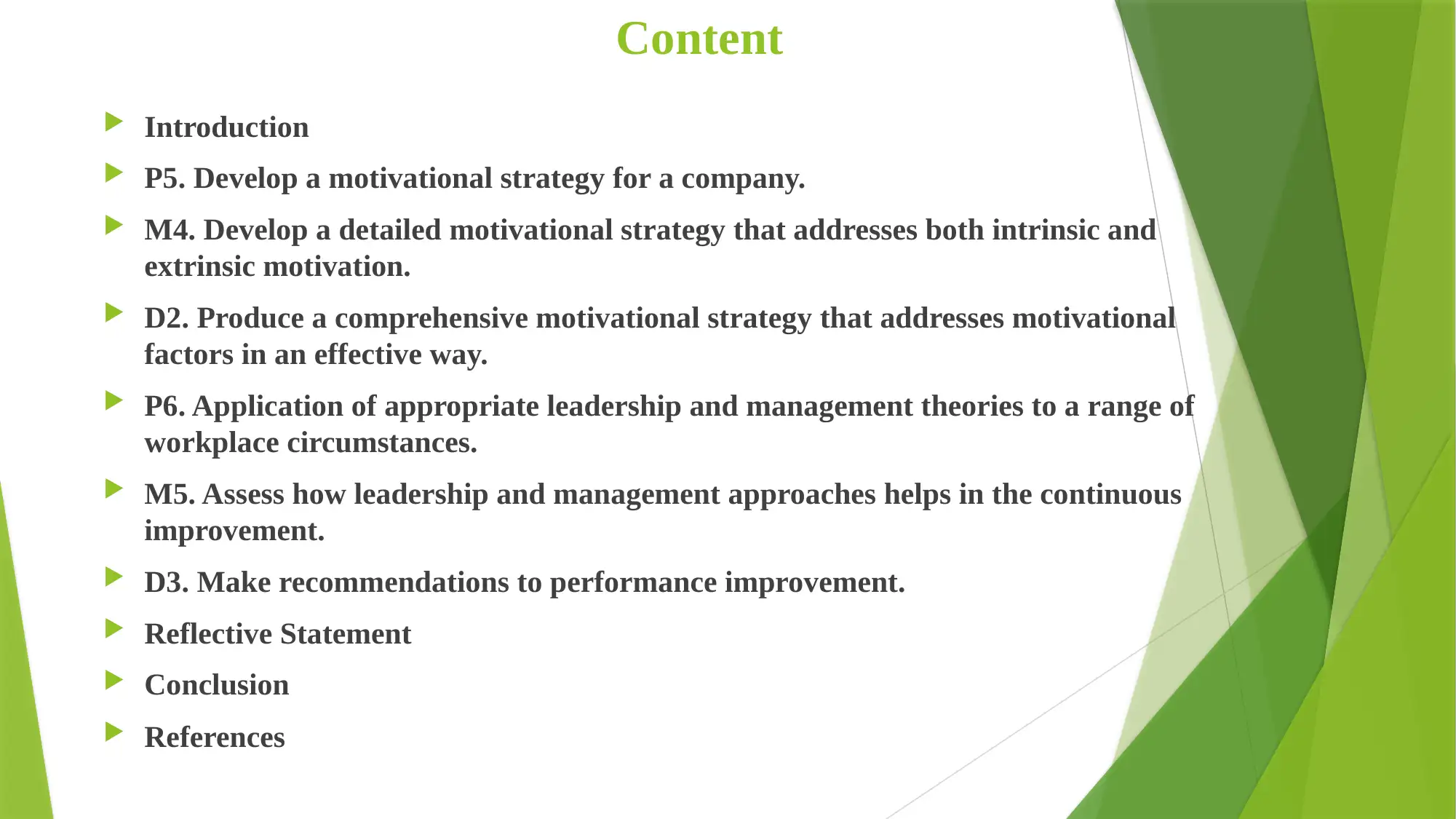
Content
Introduction
P5. Develop a motivational strategy for a company.
M4. Develop a detailed motivational strategy that addresses both intrinsic and
extrinsic motivation.
D2. Produce a comprehensive motivational strategy that addresses motivational
factors in an effective way.
P6. Application of appropriate leadership and management theories to a range of
workplace circumstances.
M5. Assess how leadership and management approaches helps in the continuous
improvement.
D3. Make recommendations to performance improvement.
Reflective Statement
Conclusion
References
Introduction
P5. Develop a motivational strategy for a company.
M4. Develop a detailed motivational strategy that addresses both intrinsic and
extrinsic motivation.
D2. Produce a comprehensive motivational strategy that addresses motivational
factors in an effective way.
P6. Application of appropriate leadership and management theories to a range of
workplace circumstances.
M5. Assess how leadership and management approaches helps in the continuous
improvement.
D3. Make recommendations to performance improvement.
Reflective Statement
Conclusion
References
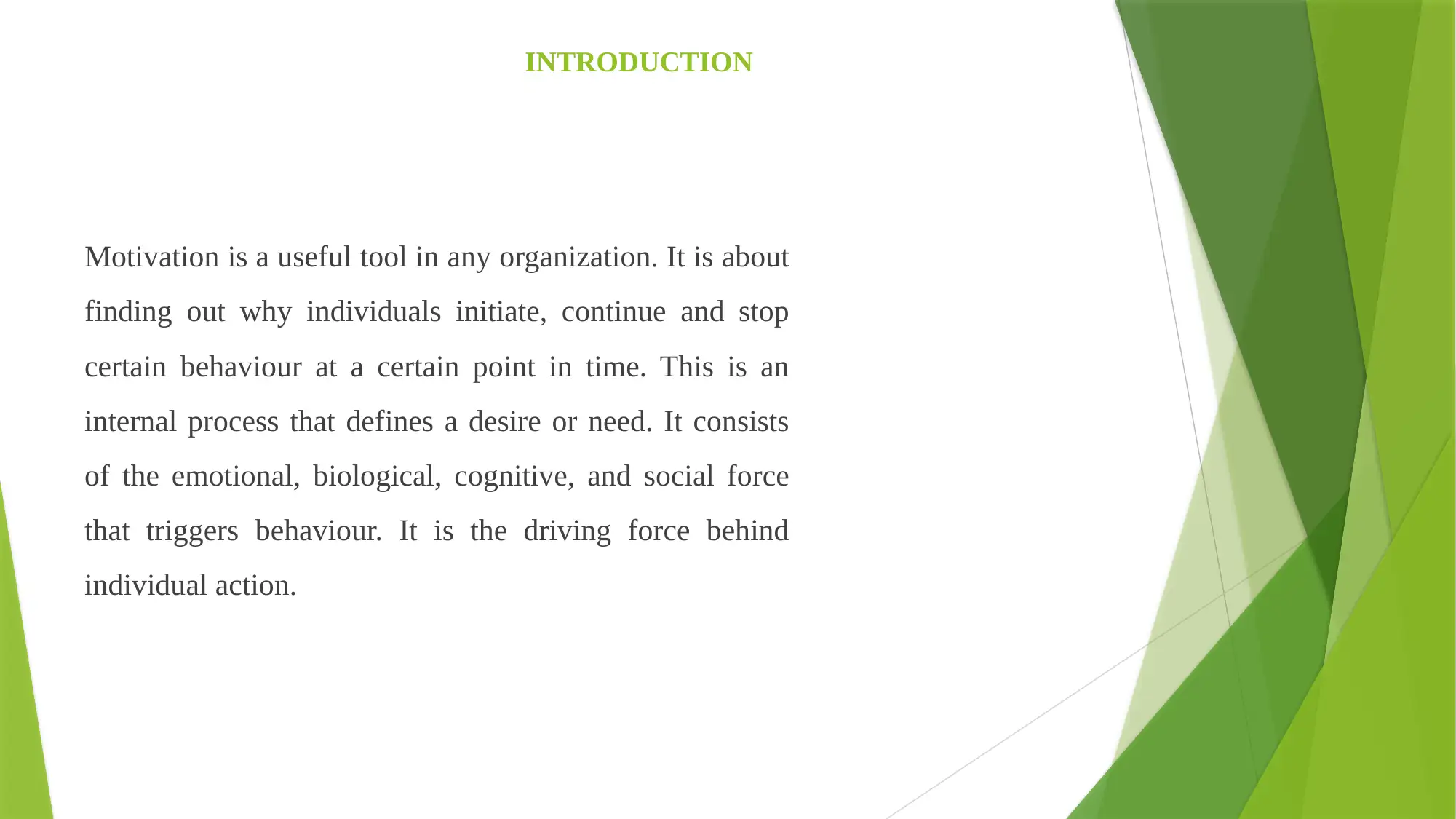
INTRODUCTION
Motivation is a useful tool in any organization. It is about
finding out why individuals initiate, continue and stop
certain behaviour at a certain point in time. This is an
internal process that defines a desire or need. It consists
of the emotional, biological, cognitive, and social force
that triggers behaviour. It is the driving force behind
individual action.
Motivation is a useful tool in any organization. It is about
finding out why individuals initiate, continue and stop
certain behaviour at a certain point in time. This is an
internal process that defines a desire or need. It consists
of the emotional, biological, cognitive, and social force
that triggers behaviour. It is the driving force behind
individual action.
⊘ This is a preview!⊘
Do you want full access?
Subscribe today to unlock all pages.

Trusted by 1+ million students worldwide
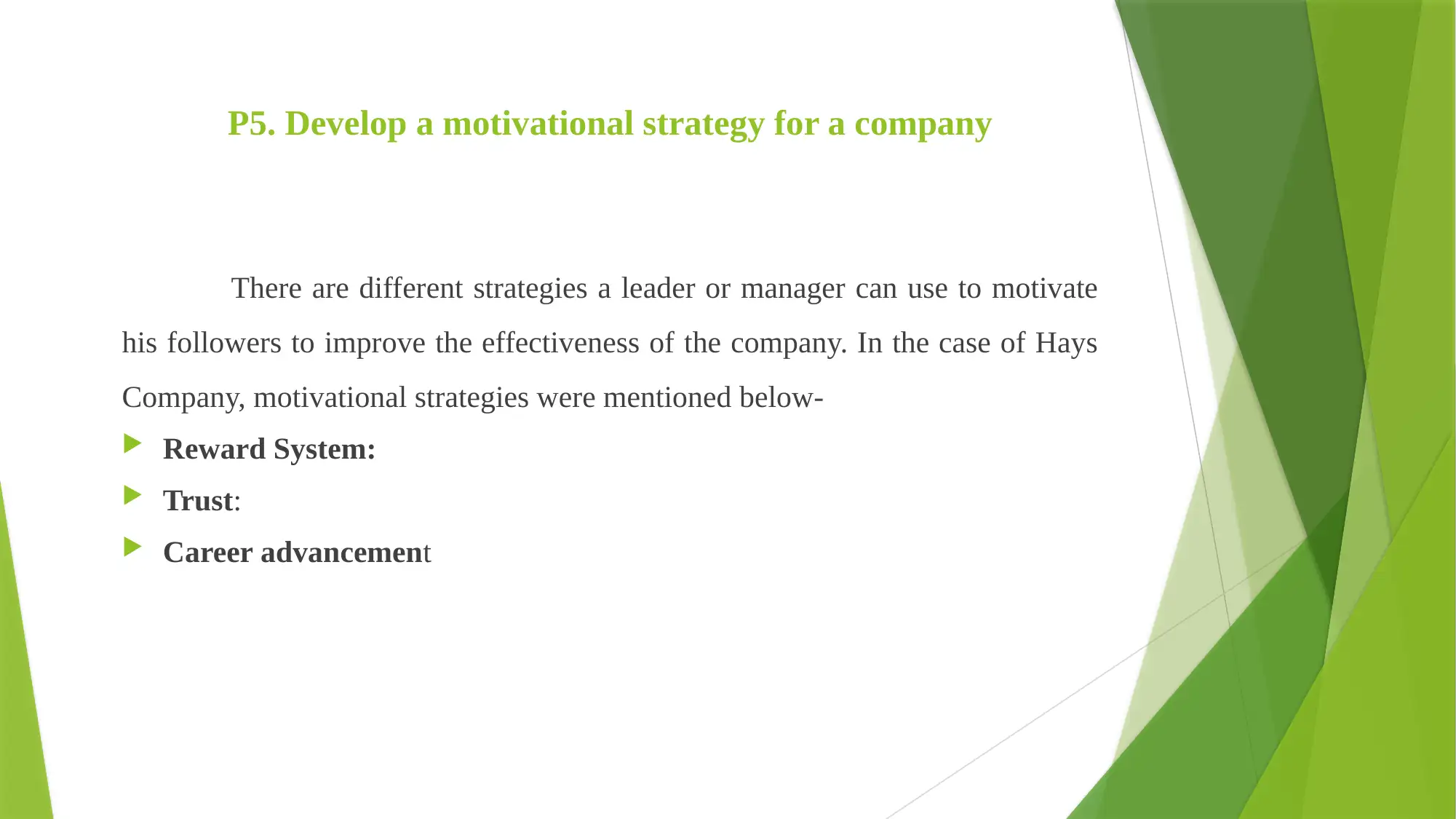
P5. Develop a motivational strategy for a company
There are different strategies a leader or manager can use to motivate
his followers to improve the effectiveness of the company. In the case of Hays
Company, motivational strategies were mentioned below-
Reward System:
Trust:
Career advancement
There are different strategies a leader or manager can use to motivate
his followers to improve the effectiveness of the company. In the case of Hays
Company, motivational strategies were mentioned below-
Reward System:
Trust:
Career advancement
Paraphrase This Document
Need a fresh take? Get an instant paraphrase of this document with our AI Paraphraser
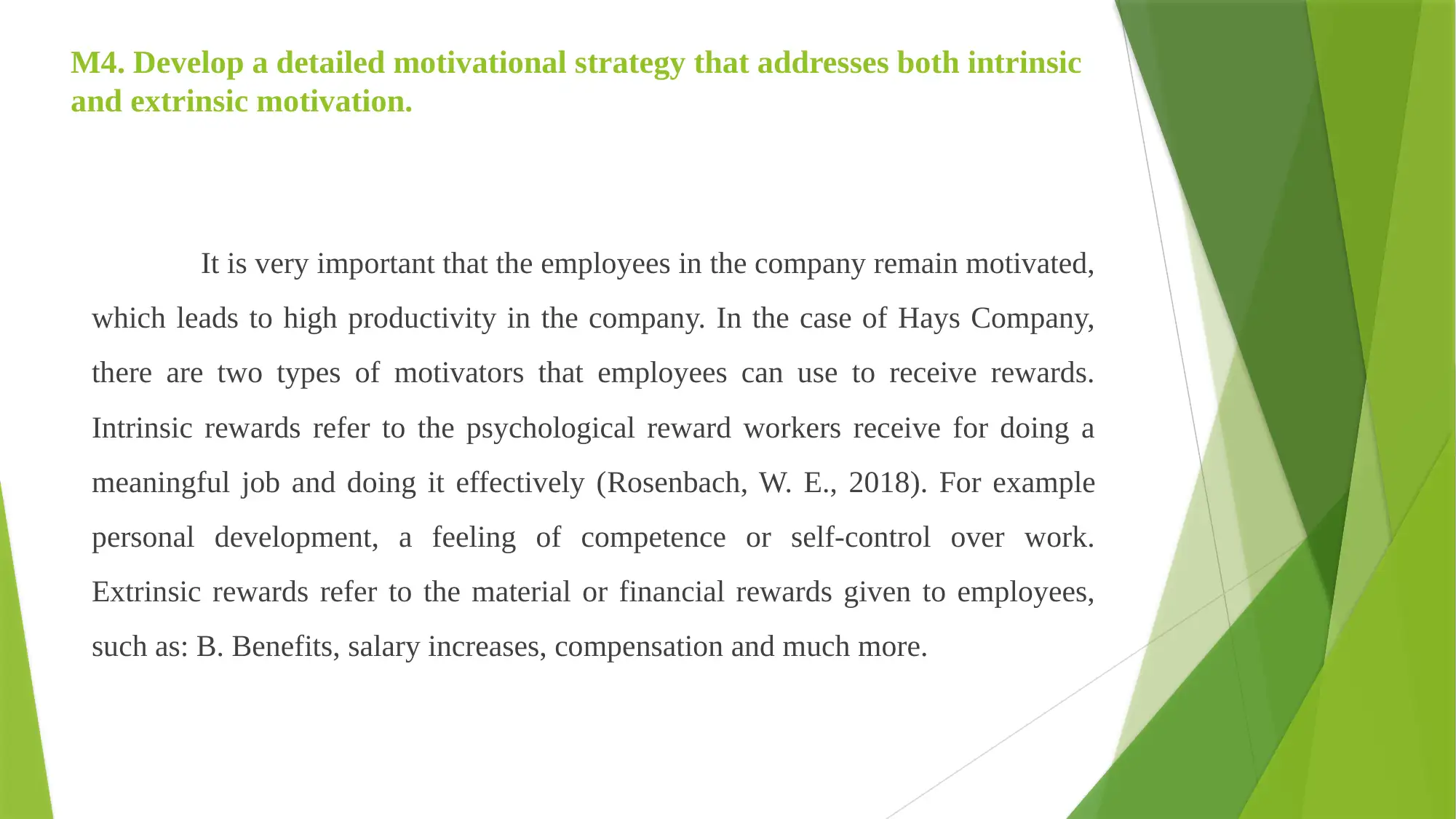
M4. Develop a detailed motivational strategy that addresses both intrinsic
and extrinsic motivation.
It is very important that the employees in the company remain motivated,
which leads to high productivity in the company. In the case of Hays Company,
there are two types of motivators that employees can use to receive rewards.
Intrinsic rewards refer to the psychological reward workers receive for doing a
meaningful job and doing it effectively (Rosenbach, W. E., 2018). For example
personal development, a feeling of competence or self-control over work.
Extrinsic rewards refer to the material or financial rewards given to employees,
such as: B. Benefits, salary increases, compensation and much more.
and extrinsic motivation.
It is very important that the employees in the company remain motivated,
which leads to high productivity in the company. In the case of Hays Company,
there are two types of motivators that employees can use to receive rewards.
Intrinsic rewards refer to the psychological reward workers receive for doing a
meaningful job and doing it effectively (Rosenbach, W. E., 2018). For example
personal development, a feeling of competence or self-control over work.
Extrinsic rewards refer to the material or financial rewards given to employees,
such as: B. Benefits, salary increases, compensation and much more.
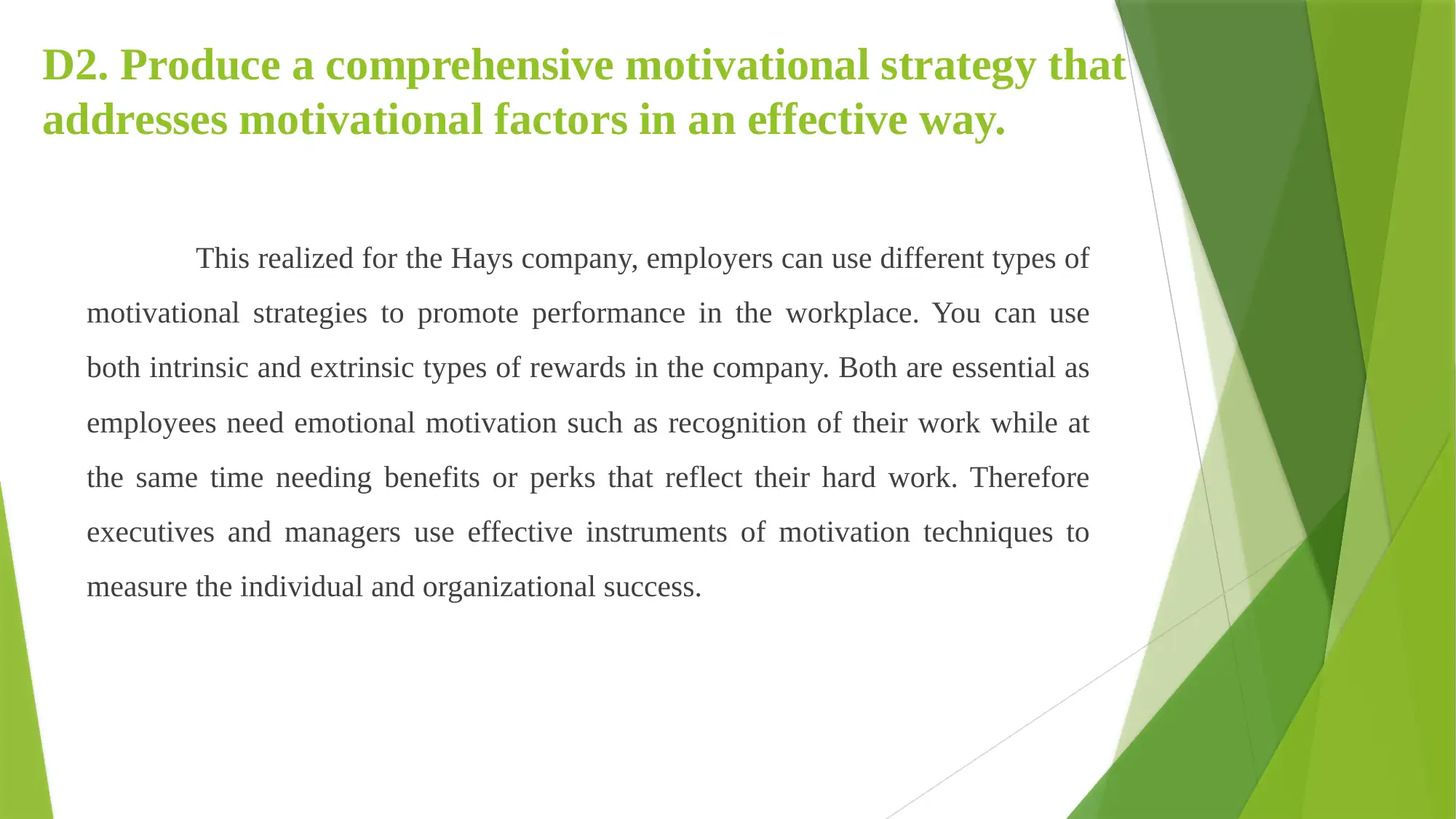
D2. Produce a comprehensive motivational strategy that
addresses motivational factors in an effective way.
This realized for the Hays company, employers can use different types of
motivational strategies to promote performance in the workplace. You can use
both intrinsic and extrinsic types of rewards in the company. Both are essential as
employees need emotional motivation such as recognition of their work while at
the same time needing benefits or perks that reflect their hard work. Therefore
executives and managers use effective instruments of motivation techniques to
measure the individual and organizational success.
addresses motivational factors in an effective way.
This realized for the Hays company, employers can use different types of
motivational strategies to promote performance in the workplace. You can use
both intrinsic and extrinsic types of rewards in the company. Both are essential as
employees need emotional motivation such as recognition of their work while at
the same time needing benefits or perks that reflect their hard work. Therefore
executives and managers use effective instruments of motivation techniques to
measure the individual and organizational success.
⊘ This is a preview!⊘
Do you want full access?
Subscribe today to unlock all pages.

Trusted by 1+ million students worldwide
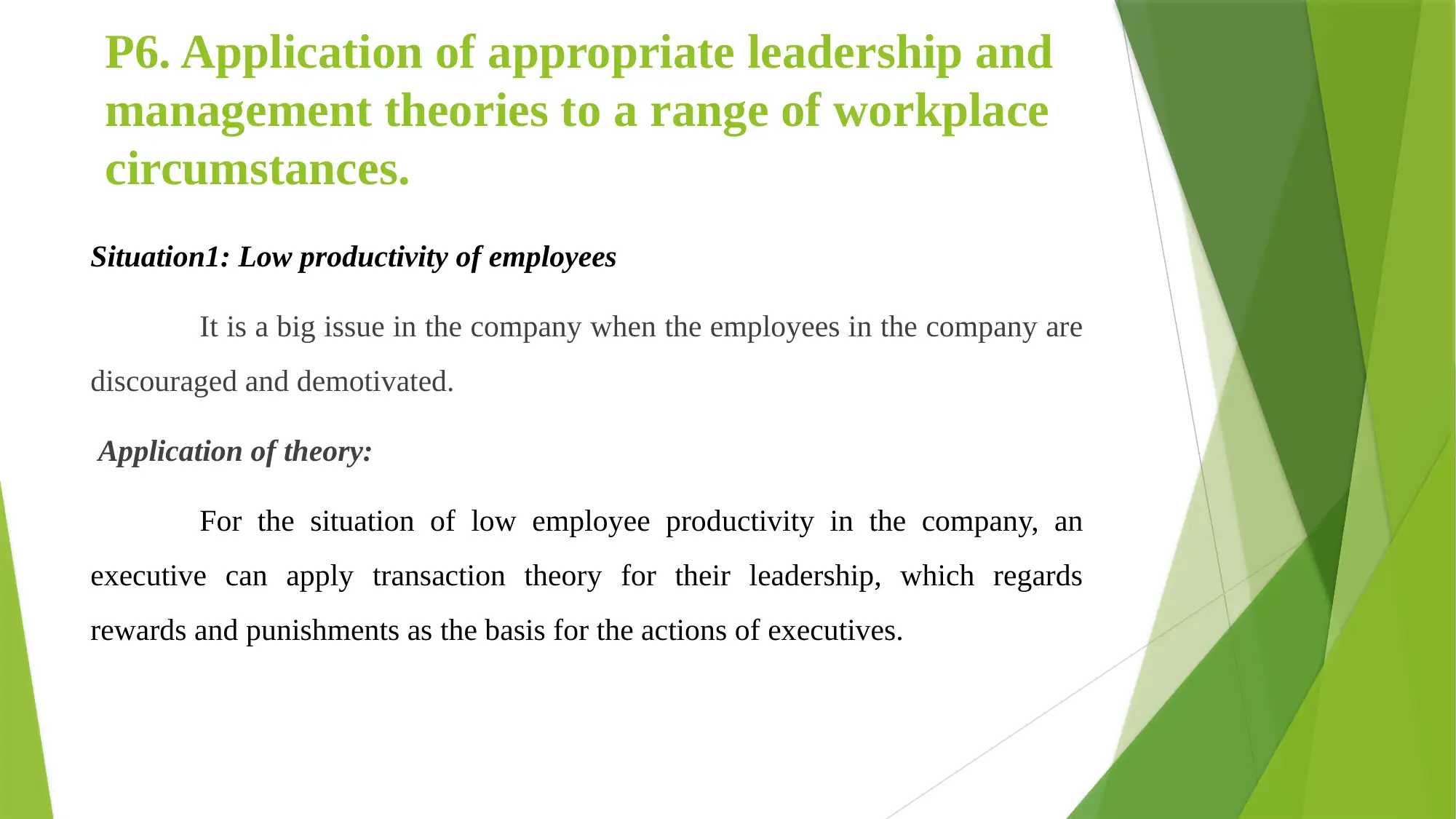
P6. Application of appropriate leadership and
management theories to a range of workplace
circumstances.
Situation1: Low productivity of employees
It is a big issue in the company when the employees in the company are
discouraged and demotivated.
Application of theory:
For the situation of low employee productivity in the company, an
executive can apply transaction theory for their leadership, which regards
rewards and punishments as the basis for the actions of executives.
management theories to a range of workplace
circumstances.
Situation1: Low productivity of employees
It is a big issue in the company when the employees in the company are
discouraged and demotivated.
Application of theory:
For the situation of low employee productivity in the company, an
executive can apply transaction theory for their leadership, which regards
rewards and punishments as the basis for the actions of executives.
Paraphrase This Document
Need a fresh take? Get an instant paraphrase of this document with our AI Paraphraser
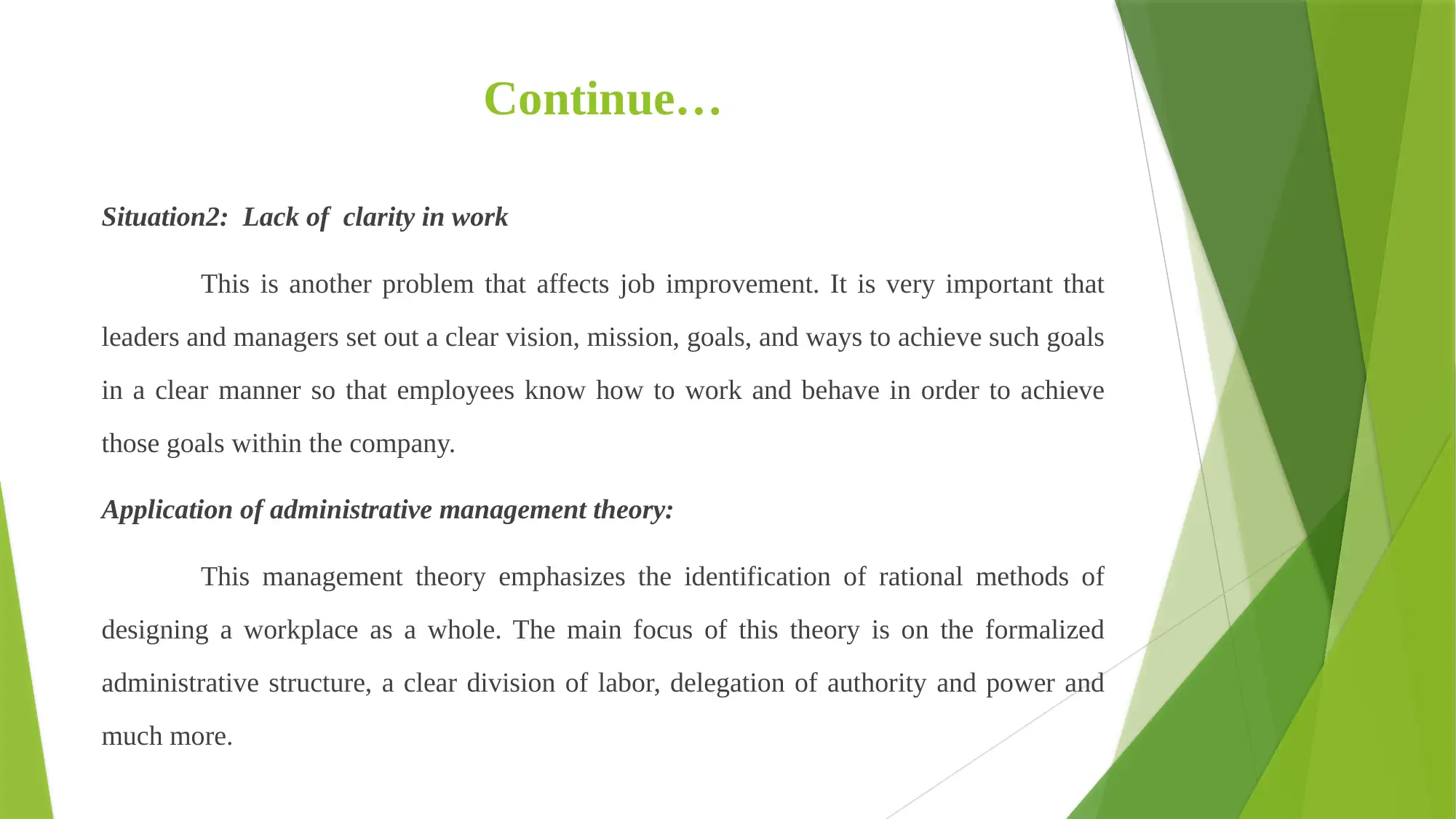
Continue…
Situation2: Lack of clarity in work
This is another problem that affects job improvement. It is very important that
leaders and managers set out a clear vision, mission, goals, and ways to achieve such goals
in a clear manner so that employees know how to work and behave in order to achieve
those goals within the company.
Application of administrative management theory:
This management theory emphasizes the identification of rational methods of
designing a workplace as a whole. The main focus of this theory is on the formalized
administrative structure, a clear division of labor, delegation of authority and power and
much more.
Situation2: Lack of clarity in work
This is another problem that affects job improvement. It is very important that
leaders and managers set out a clear vision, mission, goals, and ways to achieve such goals
in a clear manner so that employees know how to work and behave in order to achieve
those goals within the company.
Application of administrative management theory:
This management theory emphasizes the identification of rational methods of
designing a workplace as a whole. The main focus of this theory is on the formalized
administrative structure, a clear division of labor, delegation of authority and power and
much more.
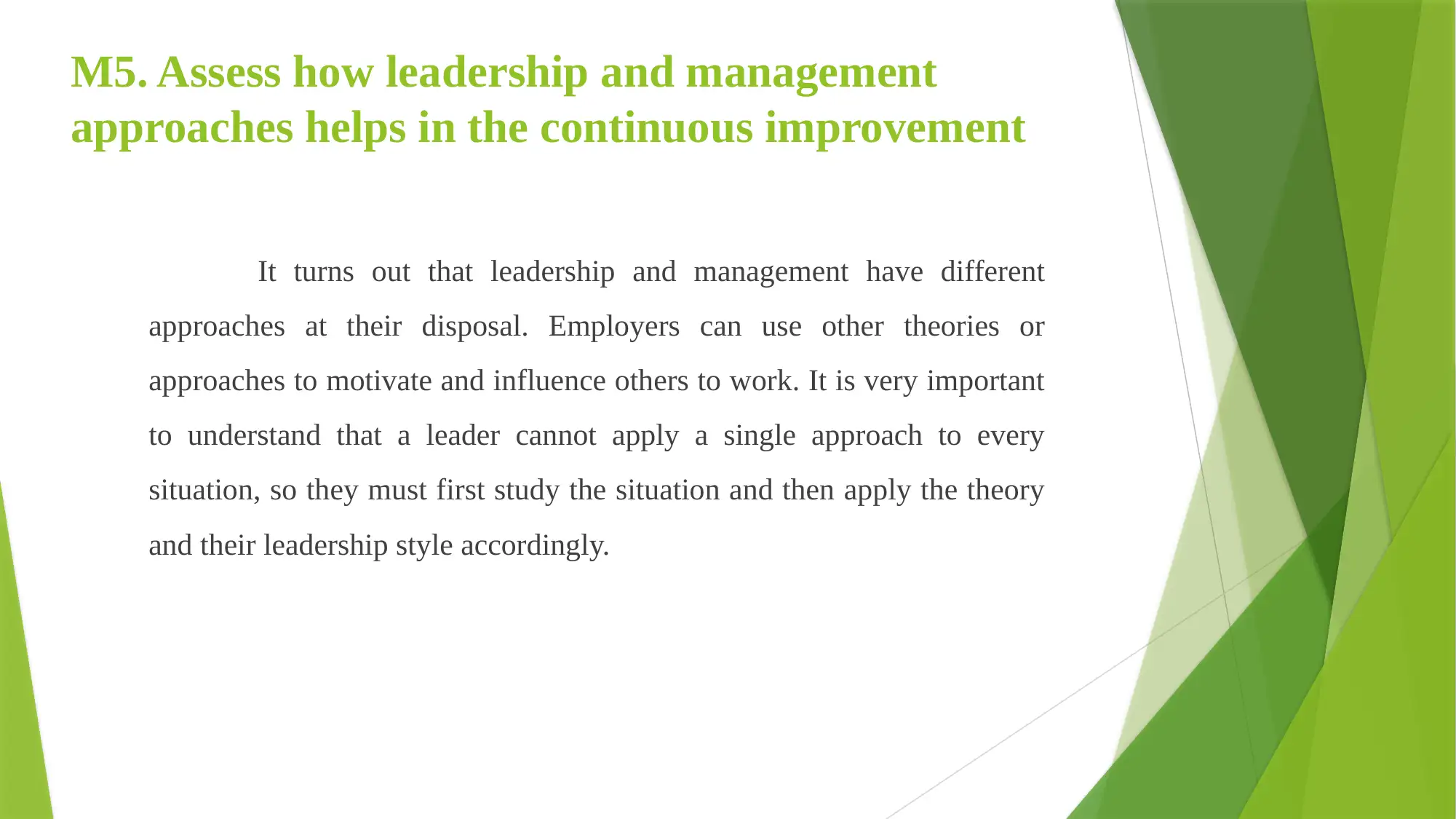
M5. Assess how leadership and management
approaches helps in the continuous improvement
It turns out that leadership and management have different
approaches at their disposal. Employers can use other theories or
approaches to motivate and influence others to work. It is very important
to understand that a leader cannot apply a single approach to every
situation, so they must first study the situation and then apply the theory
and their leadership style accordingly.
approaches helps in the continuous improvement
It turns out that leadership and management have different
approaches at their disposal. Employers can use other theories or
approaches to motivate and influence others to work. It is very important
to understand that a leader cannot apply a single approach to every
situation, so they must first study the situation and then apply the theory
and their leadership style accordingly.
⊘ This is a preview!⊘
Do you want full access?
Subscribe today to unlock all pages.

Trusted by 1+ million students worldwide
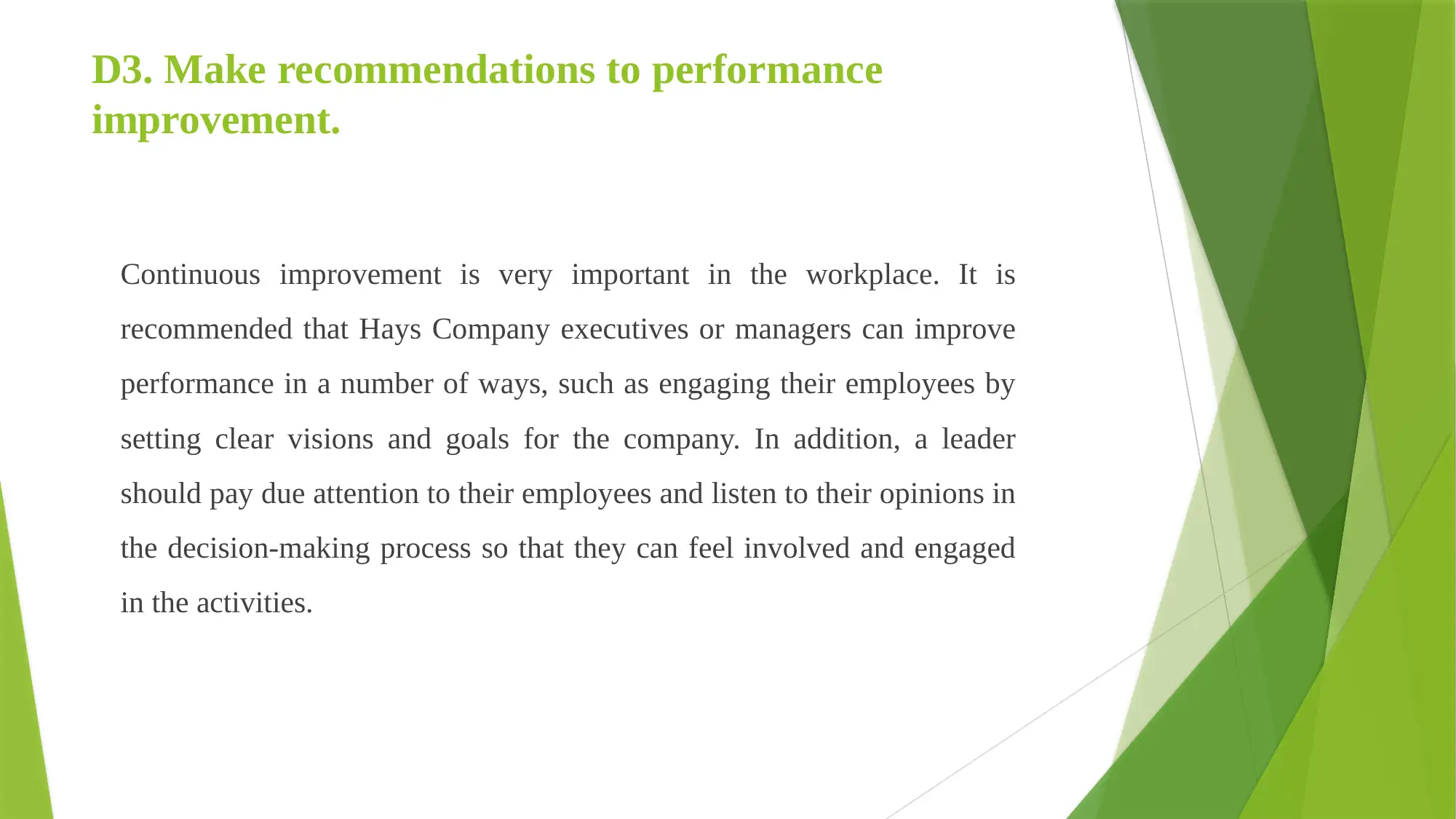
D3. Make recommendations to performance
improvement.
Continuous improvement is very important in the workplace. It is
recommended that Hays Company executives or managers can improve
performance in a number of ways, such as engaging their employees by
setting clear visions and goals for the company. In addition, a leader
should pay due attention to their employees and listen to their opinions in
the decision-making process so that they can feel involved and engaged
in the activities.
improvement.
Continuous improvement is very important in the workplace. It is
recommended that Hays Company executives or managers can improve
performance in a number of ways, such as engaging their employees by
setting clear visions and goals for the company. In addition, a leader
should pay due attention to their employees and listen to their opinions in
the decision-making process so that they can feel involved and engaged
in the activities.
Paraphrase This Document
Need a fresh take? Get an instant paraphrase of this document with our AI Paraphraser
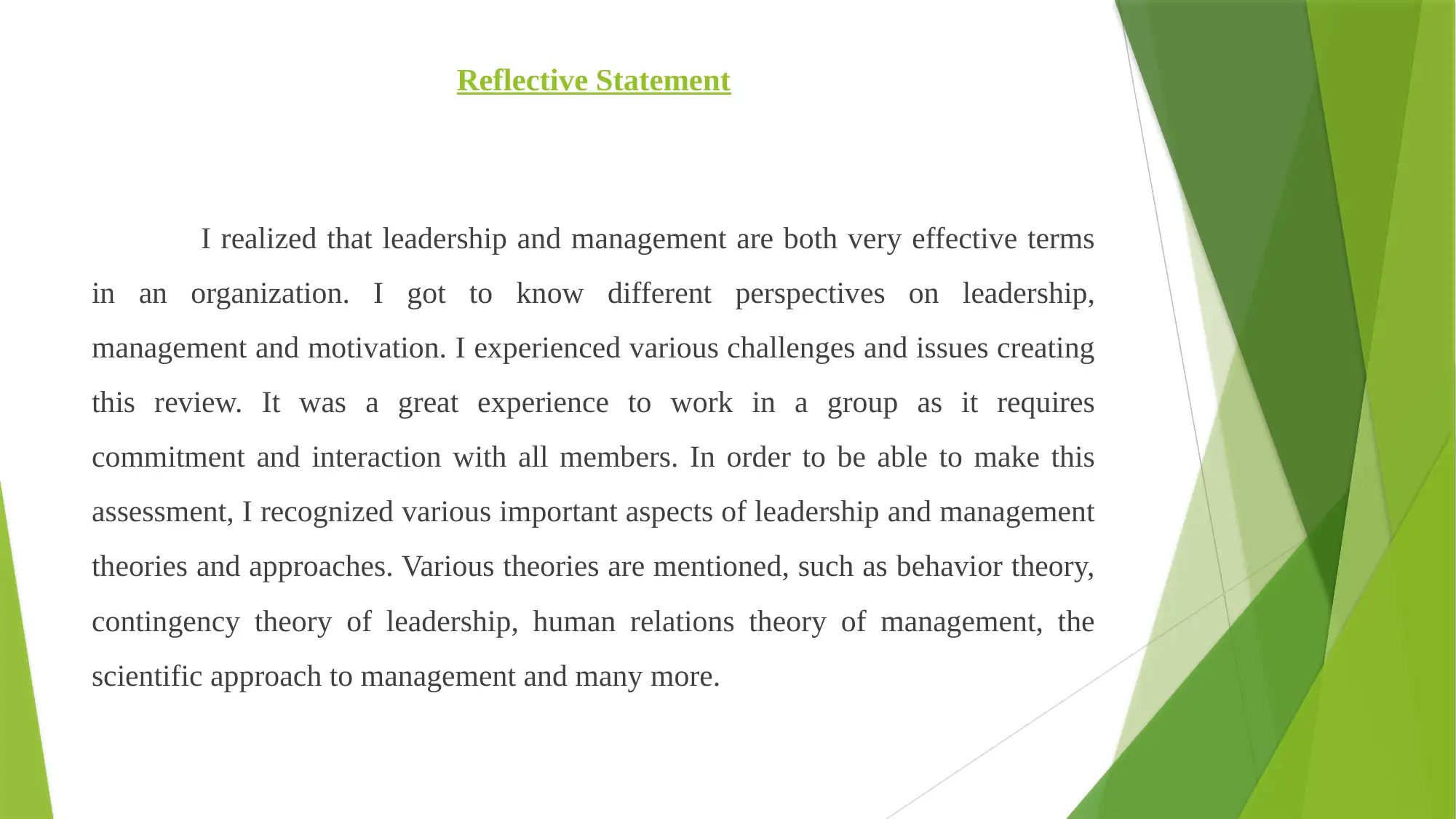
Reflective Statement
I realized that leadership and management are both very effective terms
in an organization. I got to know different perspectives on leadership,
management and motivation. I experienced various challenges and issues creating
this review. It was a great experience to work in a group as it requires
commitment and interaction with all members. In order to be able to make this
assessment, I recognized various important aspects of leadership and management
theories and approaches. Various theories are mentioned, such as behavior theory,
contingency theory of leadership, human relations theory of management, the
scientific approach to management and many more.
I realized that leadership and management are both very effective terms
in an organization. I got to know different perspectives on leadership,
management and motivation. I experienced various challenges and issues creating
this review. It was a great experience to work in a group as it requires
commitment and interaction with all members. In order to be able to make this
assessment, I recognized various important aspects of leadership and management
theories and approaches. Various theories are mentioned, such as behavior theory,
contingency theory of leadership, human relations theory of management, the
scientific approach to management and many more.
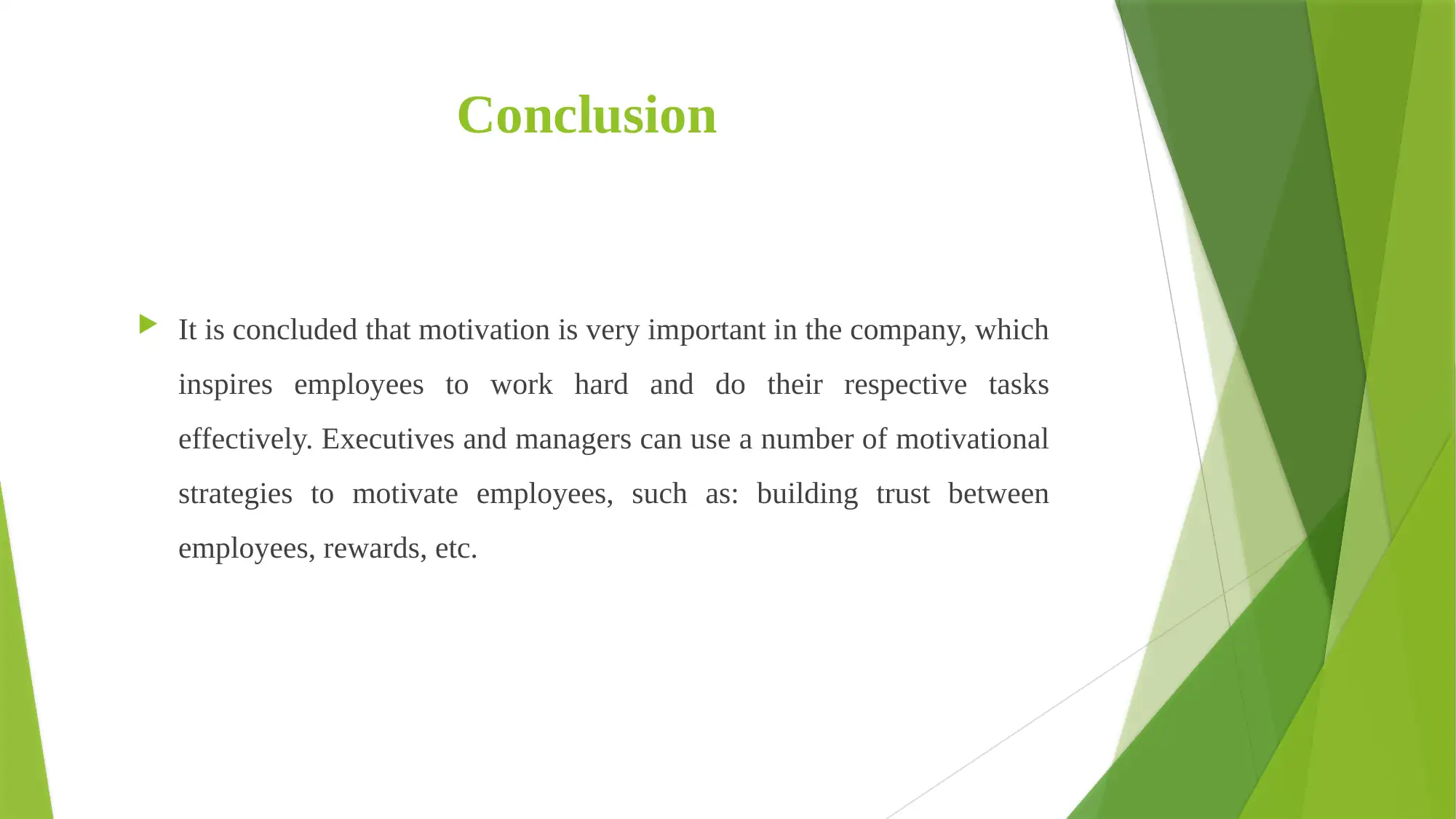
Conclusion
It is concluded that motivation is very important in the company, which
inspires employees to work hard and do their respective tasks
effectively. Executives and managers can use a number of motivational
strategies to motivate employees, such as: building trust between
employees, rewards, etc.
It is concluded that motivation is very important in the company, which
inspires employees to work hard and do their respective tasks
effectively. Executives and managers can use a number of motivational
strategies to motivate employees, such as: building trust between
employees, rewards, etc.
⊘ This is a preview!⊘
Do you want full access?
Subscribe today to unlock all pages.

Trusted by 1+ million students worldwide
1 out of 14
Related Documents
Your All-in-One AI-Powered Toolkit for Academic Success.
+13062052269
info@desklib.com
Available 24*7 on WhatsApp / Email
![[object Object]](/_next/static/media/star-bottom.7253800d.svg)
Unlock your academic potential
Copyright © 2020–2025 A2Z Services. All Rights Reserved. Developed and managed by ZUCOL.




